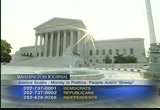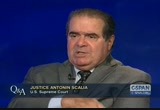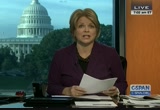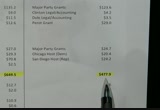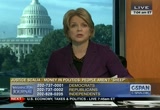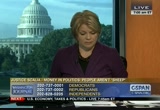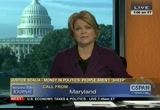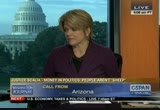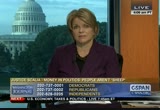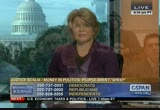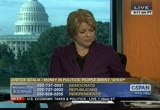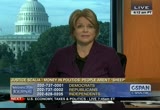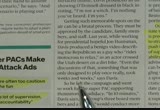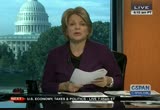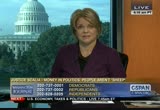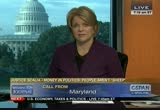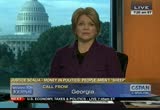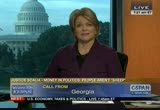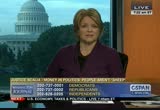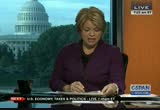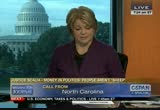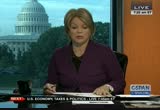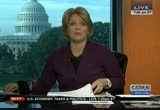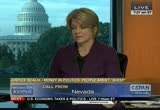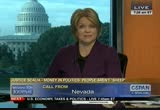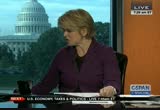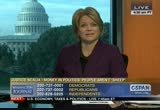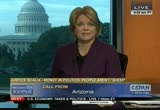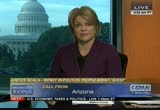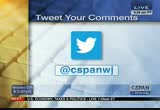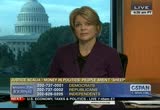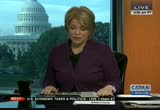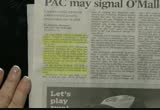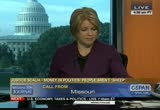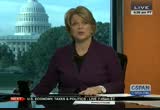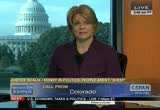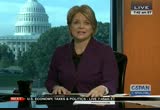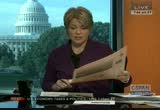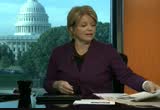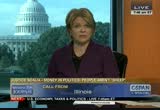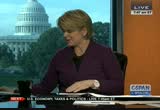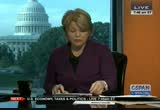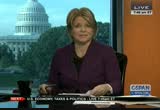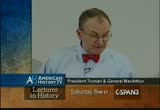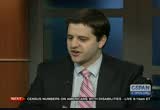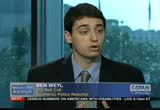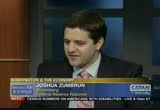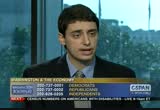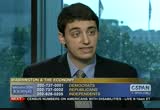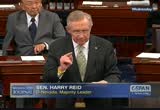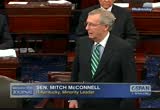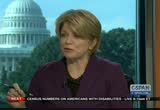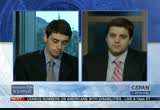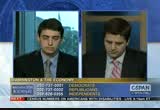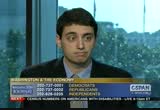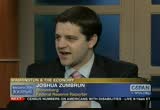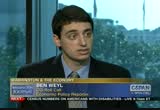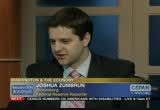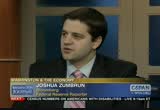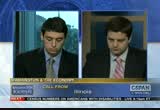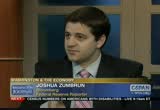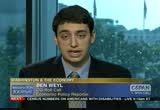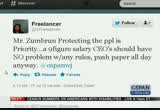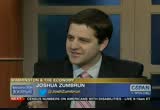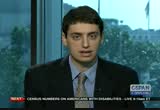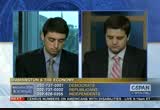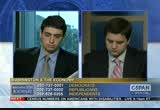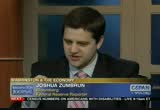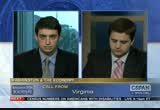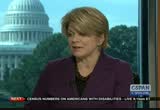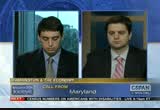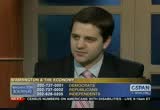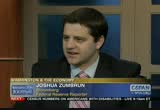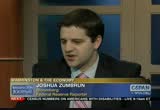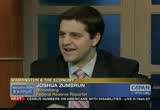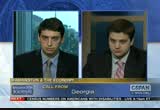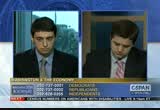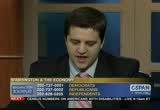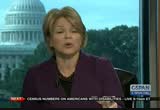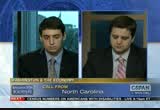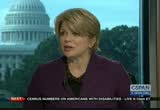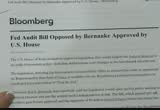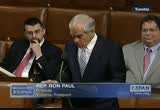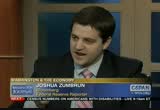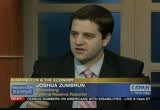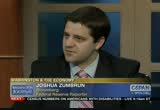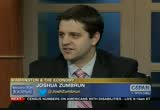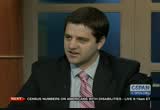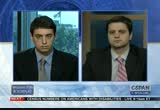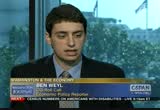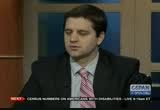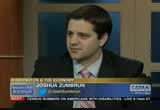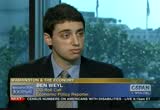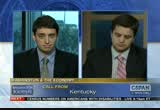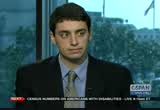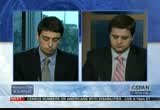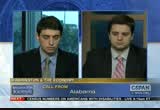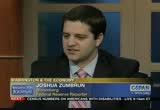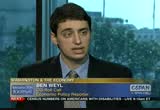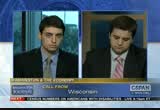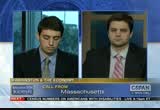tv Washington Journal CSPAN July 27, 2012 7:00am-9:00am EDT
7:00 am
coming up next. [captioning performed by national captioning institute] [captions copyright national cable satellite corp. 2012] [captioned by the national captioning institute --www.ncicap.org--] host: good morning. it's friday, july 27, 2012. you're watching c-span's "washington journal." today is the opening day of the olympics in london. the house and senate are out of session for the rest of this week. here on the "washington journal" later on in the program, we're going to have a an economic roundtable talking about washington's response to the nation's economy. and in our final segment, we'll be looking at americans with disabilities on this anniversary of the americans disabilities act passage 22 years ago. we begin this morning with a question for you that's derived from an interview that we did with justice scalia for our sunday night q&a program. he talked about the citizens united decision and he said that political advertising isn't that
7:01 am
pervasive. after all, people aren't cheap. we'll show you that clip in just a minute. so we're going to talk to you about the influence of political ads and ad money in this election year and see what you think. here are our phone lines -- let's start off by hearing justice antonin scalia in his own words and we'll get back with you on your discussions about money and politics. >> you know, i really don't. i forget what the figures are but i think we spend less on our presidential campaigns each year
7:02 am
when there's a presidential election than the country spends on cosmetics. i mean -- >> what about the fact that people are worried about what they can buy? >> if you believe that, we ought to go back to monarchy. that the people are such sheep that they just swallow whatever they see on television or read in the newspapers? no. the premise of democracy is that people are intelligent and can discern the truth from the false, at least, when as the campaign laws require. host: lotts to -- lots to react to in his statement. and thus, not bending their decisions by the influence of money and on campaign
7:03 am
advertising. so we'd like to talk to you this morning about the influence of money, about the effectiveness of political advertising and how much citizens in our country today actually do their own work before they go to the polls. we'd like to hear what you think about that. we thought we would start off by checking his comparison of campaign spending to how much the country spends on cosmetics. this is an estimate for this year from political citizens at federal elections will be about $8 billion in spending. that includes house and senate races in the presidential elections. and americans spent $33 million in cosmetics in 2010. also from the federal elections commission, just a look at this chart, if we can start over here in 1996, we're going to look at total expenditures and how that has changed. in 1996, $477 million, in 2000,
7:04 am
$649 million. by 2004, $1.16 billion. and estimates this year on the presidential level are somewhere in the neighborhood of or two 2 billion to $3 billion. what's also interesting is looking at the line below which is independent expenditures. let's bo go back to 1996. for and against were $.6 million and $.8 million. look at the increase in 2004, 85.7 million. so you can see that number on independent money pin crease since 1996.
7:05 am
and that's some of the issues behind citizens united. we'd like to hear what you think of his reaction and the american public's role. let's look at facebook. andy posts this. i agree the sentiment wholeheartedlied. isn't the same principle in play here? -- caller: a candidate act is facing a hotly-contested
7:06 am
election and he really wants to vote for a bill, knows it's the right thing to do for the country, but also realizes that candidate y can tap into candidate the untransparent very secretive huge big box coming out of some of these super packs, then he has to figure that say a million or $500,000 or whatever in the last 30 days of his election cycle will be intimidating and i think that's just what we face today and more than anything else, it really bothers me that we do not know who is contributing. we don't know what special interest group they may represent and i think it has just a terrible effect on our
7:07 am
election process. and we cannot possibly be expected to -- because we work, because we have busy lives to really check out where a lot of this money's coming from and to me, it just doesn't represent anything in the way of the best interest of our democracy. host: thanks, ann. let's put a few bits of information on screen. this is center for responsive politics information and these are some super pack supporting govern romney and g.o.p. candidates to be followed by super p.a.c.'s. let's listen to our next call from washington, d.c. you're on the air. caller: hello there. host: hi, william. caller: hello. i think that political ads, i don't think works that well. i mean, i think they're written on a probably fourth or fifth grade level. they're cliche at this point where things like the gary music
7:08 am
and that kind of thing and -- i don't know. but i have a solution to the entire corporate money in politics without violating the institutional rights and corporation of free speech and it is just simply using contract law. for example, if your corporation sells something to the federal government, then you're not allowed to donate to the federal government and that to a political campaigns and that would probably ban by probably 490 of the fortune 500 companies , lockheed, exxon, every company. you could just put it in contract law. but i don't think the politicians would ever do that. host: next up is a call from tucson, arizona. loretta, you're on the air. caller: hi. i just wanted to say that i
7:09 am
don't believe people really are voting on the issues and i think a lot of the money in politics is going into negative ads. i know here in arizona, we're full of them with senate and the presidency and it seems like the issues are overlooked and things like the health care bill, people don't even know what's in it and they say they don't like it just because democrats did it. host: what are you thinking of the tenor of the ads? are you watching them? caller: the ones i've seen so far are pretty negative on both sides. and people on facebook discussing things. i'm not sure -- tink the money should go more into ads that focus on the issues, especially the health care bill. i'm partially disabled and have lupus and i'm uninsured right now because i'm unemployed and a lot of my republican friends don't like the bill just because obama did it and they don't even
7:10 am
know what's in the bill. i think obama needs to explain to the public in real simple and direct terms why it's good. host: all right, loretta, thanks so much. on twitter, john fox picks up on the metaphor and says washington looks at the people as sheep, lead them to the barn to be shared. this is mike who is an independent there in ohio. go ahead, please. caller: good morning, susan. i'm afraid we are a sheep. we are ourselves and the people of the united states are allowing this to happen. why is corzine and all them banksters not in jail? we have a live bird situation going on where it has been proven that they had been manipulating the interest rates but yet no one has been prosecuted. eric holder hasn't even started any investigation on this. timothy geithner knew about this since 2008. that just lets me know that the whole system we had is corrupt.
7:11 am
the only way that this is going to change is that we, the people, stand up and throw these idiots, these crooks and banksters in jail. thank you. host: let's take a look at super pack spending as it's recorded this year so far as of july 26. 693 groups organized themselves as super p.a.c.s. caller: i just want to comment on all this money being spent. are you there? host: i'm listening. caller: oh, ok. with all of this money being spent and all of the talk about
7:12 am
the economy, why isn't some of this money being put back into the economy instead of people trying to buy, you know, the election? do you understand what i'm saying? host: i do, bren d.a. what about the argument that when you're spending money buying advertisements in a local community, that money is going into the economics of that community? caller: i've never seen any of it. what does it do? host: well, people have jobs. that's the thought behind it. so you want money to go directly to people to help them? is that your point? caller: o but what jobs are being created? or what jobs are being -- who is being helped by it?
7:13 am
host: what would you like to see happen, brenda? caller: i don't think campaigns should be bought to be honest with you. host: they should be publicly funded? caller: well, however they would have -- all of the tens of millions and billions and billions and billions of dollars that are going into campaigns, i don't know where the money is going. we don't know where that money is going. host: ok, thanks for your call from austin, texas. this is from bloomberg "business week." why super p.a.c.'s make the best attack ads. --
7:14 am
host: there's not a lot of supervision, oversight or accountability, says mark mckinnon. -- let's take a look at some recent super p.a.c. advertisements on the presidential level. >> mitt romney, the businessman. take a look at his record. romney bought companies, drowned them in debt, many went bankrupt. thousands of workers lost jobs,
7:15 am
benefits and pensions. but for every company he drove into the ground, romney averaged a $92 million profit. now he says his business experience would make him a good president? if romney wins, the middle class loses. priorities u.s.a. reaction is responsibility for the -- responsible of the content of this advertising. >> america's jobless rate just went up again but after a record 42 straight months of unemployment, president obama insists. >> the private sector is doing fine. 20 million americans can't find jobs. thousands of them have been out of work for a year. and under obama, nearly 800,000 more women are unemployed. >> the private sector is doing fine. host: we're talking to you about money and politics specifically in an interview with scalia
7:16 am
suggesting mock si -- democracy, people can think for themselves, people are not sheep. we're asking you to react to that and your thoughts on how much people do investigating the candidates to make their decision. evansville, indiana. next up is caleb, an independent, you're on. caller: hi. thank you for accepting my call. i want to comment on justice scalia. he said the premise of a democracy. well, our government was not designed as a democracy. our government was designed as a republic. 49% of the people aren't sheep and that the 51% are. and because of this premise that we are a democracy, we're supposed to be a democracy gives -- and ignores the 49% who
7:17 am
aren't sheep. anybody who focuses on the candidates know that either of them have a clear vision on how to fix the economy or what the real problems are. host: thanks, caleb. on twitter, don richie tweeted this -- let me turn to a few newspaper stories that are part of our topic this morning. first in the "washington post," u.s. olympics committee --
7:18 am
the organization agreed to take the ads off the internet and off the air. the restriction may spell bad news for romney and his supporters who point to the republican candidate stewardship of the 2002 salt lake winter olympics as a key selling point. -- bill burton said we were more than happy to take the ad down. next up is a phone call from silver springs. this is gregory from maryland. he is a democrat. good morning. caller: good morning. we're talking about the messages that are financed by private --
7:19 am
respect private giving. what are your thoughts on that? caller: i would ask them what were the campaigns publicly financedsome i'm a common citizen with their message? i mean, they would talk about a graeme -- great many differencing that the powers that be currently talk about in their messages. and i think -- i don't want to repeat myself but the idea is publicly finance campaign then i believe more real actual messages dealing with the most of us, the 99%. these would be the messages and disclosures that we would hear on our tv's and radios.
7:20 am
no? host: thanks. this is a call from allen who's a republican there. go ahead, allen. caller: good morning. it's been a long, long time since i called in the past but i'm compelled to call about this topic since i know quite a bit about it. the truth is that it's all about money. the message doesn't matter. all that matters is a five-minute period when the vote is in the booth and they vote for people whose names they recognize. the reason they recognize them is a, they're in the incumbent and they've heard the name or they've read about it in the newspaper, or b, there's been sufficient advertising by that person to get them elected. host: does that work at the presidential level as well be whether the candidates are quite well-known? >> no, the presidential level -- both individuals will know and
7:21 am
the incumbent will win, typically because they are a known quantity and they can do so just before the election to carry favor with the electorate and people tend to vote in the incumbent. they do not think about the -- they don't know what the politicals are. they don't know what challengers want to do. they just vote who they have a warm and fuzzy feeling about and people spend some time going through each candidate stands for, they would vote according to their -- they're using their brains but they use their hearts and their emotions and they vote for whoever they like and that's the problem. host: you started out by saying you know a great deal about this congress, why? >> i am running for congress and i have a whole article about why people are elected. if i am elected, i'll probably
7:22 am
be on your show. but only with you. none of the other hosts. host: is this your first try at federal office? caller: yes, it is. i'm 63 years old, susan, and i cannot stand what the government is doing to the country. it is literally eviscerating the country. as i say in speeches, there is nothing wrong with the united states, but there's a lot, lots wrong with washington. you have to get wrid of the incumbents and there's a really easy way to do it and it's not term limits. it is cutting off their pension if they don't leave within six years. after six years, they're gone. the people have been in there 20 years or 25 year or 25 years or 30 years. they have to get out of the next election or their entire
7:23 am
pensioning is faltered and that by pasts the need for term limits. host: romney is in london now along with interviews and other events he had a fundraiser and here are some reporting of it. after a day made long about his remarks about london's readiness about the olympic games -- host: lewis bacon, a funder of
7:24 am
moore example management who splits his time between new york and london -- let's go back to twitter and scott writes this -- next is a call from dylan, north carolina. ben is a democrat there. good morning. caller: good morning, good morning. as an educator, i'm coming at it from a different perspective. unfortunately, people are not taught or encouraged to think in our school system. it is easier to just listen and be persuaded by something said. witness this. some negative ads are because of
7:25 am
tear being distorted. some negative ads are are so-called negative ads are because the actions of the candidates. we weren't able to differentiate between the two. so we lump everything from some sort of negativity and we say everything's negative. now, we are, however, taught to be defined by money. the more money you have, the better you are. something's wrong with this picture. and unless we get true education reform, we won't be able to proceed as a nation, the greatest nation on this planet. we must be taught to think. that's why we're going to go to the slaughter as sheep when these advertisements come on, unfortunately. it is really, really sad. host: thanks. the folks at "the washington post" have published a lot of statistics about money in this election cycle. you go to the website, you'll see lots more than we can show
7:26 am
7:27 am
host: that's a look so far from from the "washington post." next is a call from las vegas. this is brian, and he's an independent. caller: good morning. can you hear me ok? host: just fine, thanks. caller: like the lady said, to learn how to learn, learn how to think. read about our founding fathers. thomas jefferson, especially, john madison, george washington and what they said about how banks will eventually corrupt our politicians in the future. these gentlemen, intelligent gentlemen, said this over 150 years ago and it is happening today. it hurts my ears that all this money is being poured in to buy elections. think and like the republican from georgia, i believe it was, think and research the people you vote for. disregard these ads.
7:28 am
vote how you are supposed to vote by researching these people. think for yourself. this money has corrupted our government and i am sick and tired of it which is why i as a black independent voter and voting for ron paul. i'm not voting for romney. i'm not voting for obama. end of story with that. and i got another suggestion. can you still hear me? host: sure. caller: if you really want these politicians to stop campaigning 70% of the time, change the structure. the people can do it. government should be afraid of the people. the people should not be afraid of the government. the house of representatives, two years, have it for three years. president, instead of four, have it for five. and then you're done forever. you can no longer if the constitution has changed, we'll have a national convention. you could no longer run for
7:29 am
federal, political -- federal political offense. -- office. get out and let somebody else run our country the way it's supposed to be run and let all the citizens of america, regardless if you're democrat, republican, or independent, we are since -- citizens of the united states and citizens of humanity. get these banksters out of our system. period. host: thank you, brian. what are the messages this year? this is "the washington post." this is spending on issue-related ads so far. number one, jobs. number two, budget and government spending. three, anti-obama messages. four, taxes --
7:30 am
this is a call from bubba. good morning. what's your real name, bubba? caller: francis. i like to use bubba. host: glad to hear from you this morning. caller: thank you. i watch you every morning and c-span's one of my very favorites. i have a small family-owned corporation. the corporation does business in north carolina. we pay taxes there. we do business in texas. we pay taxes there. and then the corporation pays united states taxes. when the corporation pays a dividend, it's that dividend is taxed. we pay half of all the employees social security withholdings. with all that in mind, i say my corporation can give as much money to my politician as they
7:31 am
deem well wish and at any time. somebody ran up the flag many years ago and said no taxation without representation. and i would appreciate it very much if the socialists would get off the back. we keep the country going. say a prayer for us. thank you, u.s.a. host: bubba from north carolina. joseph ramirez picks up on justice scalia's comments about our comparisons to spending and cosmetics. deliver
7:32 am
host: next up is phoenix as we talk about money and politics and wonder are the american public sheep? did they follow what the ad say? steve in phoenix. go ahead. caller: i've been watching c-span for gosh, almost 20 years now and i've seen you personally on tv and i have to admit, i don't know your first name because they don't show your name on the screen. host: it's susan. caller: i thought it was sue, actually. i don't want to guess and get it wrong. what i want to say is when the conservatives talk about wanting less government, less government power, it's just code for less people power. and we're a democracy.
7:33 am
that means ruled by the common people. and that means the common people are the rurals. politicians don't rule us. -- rulers. politicians don't rule us. churches don't rule us. we, the people, rule the country. and we forget that because we're so intimidated by these big power structures in our country that the government is the people power. and, you know, it's just very scary times ever since the 2000 election, i remember that night when they switched florida and i'm just like oh, my god, i couldn't believe it. this has never happened before and the mainstream media goes along for the ride. they're like accomplices or accessories to the crime and you new york city another thing i want to say is there's two kinds of people in this world. there's people that have opinions based on their beliefs and there's people that form their opinions based on facts. and you've got to be a fool to base your opinions on beliefs
7:34 am
because you're not dealing in reality. the free market, when they say the free market, it's code for blarkt. -- black market. our society is 100% corrupt. thank god for obama and his administration. he's got to play ball with big corporations. he's got to go on -- they're more powerful than the government now. host: thank you, steve, phoenix, arizona. back to facebook. here is camellia west who writes on facebook -- and going back to twitter, 90%
7:35 am
of americans have already decided for whom they will working says physguy. next, we have a phone call in new jersey. marlene, an independent there. caller: i would like to say one thing to the man in arizona. we are not a democracy. we are a republic! that's a big issue. the reason i called about money, early this morning, i saw something that is in store for america if they don't wake up. bankers in europe talking about countries having to give up their sovereignty to the bankers.
7:36 am
how much is obama looking out for jobs in america? people need to wake -- since a man came here 100 years ago, his name is paul wahlberg. he came from germany. he was a banker. up until that time, america had no central bank. within 10 years, he had a central bank initiated by a sneaky hunting trip and since then, people have slowly becoming slave to the banks. they're the ones calling the shots. they're the ones that got bailed out even though they were the ones that did wrong and they're so powerful that no one has been held accountable for the banking mess in this country. thank you. host: marlene from new jersey. another twitter --
7:37 am
back to stories about funding and the newspapers. anti-incumbent super p.a.c. leader starts second super p.a.c. the congressional elections p.a.c. shares an address with american strategic analysis and performance services -- that's just a look at how the system works. in maryland, p.a.c. may signal o'malley's next step. in a sign of lofty national ambitions, governor mark
7:38 am
o'malley created a committee that become a financial vehicle for a presidential run in 2016. that's the "baltimore sun" this morning. back to springfield, missouri, by phone. chris is a democrat. you're on the air. caller: i have two comments. one against scalia. it's interesting how a judge, a supreme court judge, has the time or the ability to stand up and say that he's for this or against that in a political era. basically, people aren't sheep. i agree there, but at the same time, he allowed media companies and super p.a.c.'s to present
7:39 am
their idea that people are sheep . i find it very interesting of a judge of his magnitude is always sticking hi nose in a political situation when he was appointed to make decisions based on whether political ideas are fact or fiction. i think it's very wrong for him to even be quoted to even take that position. it's the media companies that are making all of the money. it's the media companies that are lobbying to continue this political farce that we have in this country. why don't we just set it up and say ok. you people have six months to run. you have this certain amount of money. if you can't say what you've got to say in six months, then you shouldn't even be running for office. thank you very much.
7:40 am
host: thank you. glad to have you. back to foventse next up is colorado. michael, an independent. caller: hi. i just want to say that i think citizens united is legalized bribery just because something is passed with judgment or legislation does not means it's not corruption. and we've lost that idea just because it's legal, that is not corrupt.
7:41 am
a few callers like to argue this is a democracy or republic, it's really, we have a constitutional democratic republic. we elect our leaders through democracy. the constitution tempers us and they represent us. host: thank you, michael. here's emma on twitter who writes to us. and wee gotten a few e-mails to share with you. tim writes us this. this is from d.w. from seattle.
7:42 am
and finally, this one, steve in illinois writes an e-mail. this is a call next from littlefield, texas. this is robert lee, who is a republican there. good morning, robert. you're on the air. caller: yes, ma'am. host: robert, turn down your tv volume. we're getting some feedback. caller: all right. hold on, ma'am. host: i always worry that it's in a room far away when i say that. ok, robert, we have -- caller: yes, ma'am.
7:43 am
i believe that the governmental -- i'm at a loss for words, ma'am. host: ok. would you like a second more to gather your thoughts? we're talking about money and politics. caller: yes, ma'am. i thinkity lost my mind. i'm sorry. maybe later. host: thank you for making the call. we appreciate it. next up is a call from savannah, georgia. this is jeffrey, a democrat. you're on the air. hey, jeffrey. all right. we're going to move on. sorry about that. next up is a call from chris, an independent from albany, new york. caller: hi. i have to question anything scalia says. he says the supreme court isn't politicized but if you go back to justice thomas and his 38 or 39 decisions were the same as scalia's. so it seems like one falls in
7:44 am
lock step with the other. my point with money and politics is the election obviously is a media circus. host: ok, chris. thank you for your call. we're just about out of time here. we close out the first part. condoleeza rice whose names keeps mentioning has put together an op-ed piece printed in the financial times this morning.
7:45 am
7:46 am
our question is the -- justice skeerks people are sheep. time for a couple more calls. next up is savannah. jeffrey is a democrat there. caller: hey. host: you're on. caller: good morning. host: what's your opinion? caller: only thing i want to say is i'm going to repeat it one more again. between the two sides, the senate and the democrat, well, republicans and democrats, all the money that the super p.a.c. is spending, i believe that will bring down our deficit. host: ok. thank you. next up is a call from bloomington, illinois. an independent there. caller: how are you doing? being an independent, corporations are bought so much power out of our doft that they sold the people down the river. we just can't -- we can't keep going this way.
7:47 am
as far as i'm concerned, the one guy that was on a little earlier, i have to strongly disagree with just because he is a corporation does not give him the right to give as much money as he wants. he is an individual can give up to whatever the legal limits are but the corporation, as far as i'm concerned, if you are not a living breathing human being, you have no business buying my politicians. host: ok, thanks from bloomington. and travis writes who watches tv anymore anyway? so that's it for our discussion with you on money and politics. and justice scalia will be the full interview will be on sunday night and we will be airing it in our q&a program. and we are -- i'm hesitating here because i have a clip to show you and i'm not quite ready. we're going to take a couple
7:48 am
more calls. i can't take calls without them punched up for me. we'll go to a twitter comment. having just a little problem with our technology here this morning. sorry about that. and back on twitter, we can hear this from don richie, once again. well, we're going to move on from that one. all right. let me just push a button and see who's there. caller, who are you calling from? caller: waco, texas. host: ok, sir. you're on. we're talking about money and politics. caller: i'm very conservative and i think romney should release his tax return and his bank documents or obama releasing his tax -- his college transcripts, his tax documents and his birth certificates. -- info. and that was -- host: ok, sir, your sentiment has been echoed by the
7:49 am
conservative union leader in new hampshire who put in an editorial yesterday about mr. romney's taxes. they say if he intends to win, he's going to have to make his tax form public. this storm won't go away. next is a call from new york city. this is bill, an independent. hey, bill, you're on. caller: good morning. thank you for taking my call. one way i see is getting all the money in this politics in the election is to have a whole brand-new congress and senate in the fall there because we really have nothing to do with -- as far as electing the president goes. it is selected by the electors. we need all new congressmen and new senators. we don't need a constitutional convention to change that. we, the people, have the power of all vote. that can limit -- try to do term limits every two and six-year terms. only if we want to change those
7:50 am
terms that we need a constitutional process there. host: ok. thanks, jack. we've got all our ducks lined up now. so we're ready to go to the break. let me tell you what's coming up. we're going to have a discussion with two reporters who cover washington and political related to the economy. joshua zumbrun is a reporter for the federal reserve and ben weyl is an economic policy reporter that looks at what's happening on capitol hill. we're going to talk to you -- they're going to talk with you about the economy and what leverage has washington has. we'll be right back. >> the first weekend in august, visit the kentucky city named
7:51 am
for louis xvi. >> we've amassd over that 128 years, an absolutely phenomenal collection. >> everybody's heard of the lois and clark expedition and what many people don't realize is it has very deep root here's in louisville and in kentucky. many historians believe this is the only verified animal artifact. we know from information that we provided and from family tradition that family uses as a doorstop. >> a weekend in louisville, august 4 and 5, exploring the heritage and literary culture of kentucky's largest city on book tv and american history tv on c-span2 and 3. this weekend on "american
7:52 am
history tv." >> let me just begin to open up the discussion by asking you this. what exactly is the nature of the clash between macarthur and truman? is this a clash over policy? is this a problem of personalities? >> from lectures and history, true man and macarthur. johns hopkins professor elliott cullen on the relationship that led a president to lead a jean jen at the height of the war. the chain of political history. stevenson once said he had a bad case of hereditary politics. his great grandfather suggested abraham lincoln as president. "the contenders".
7:53 am
washington redskins continues. host: -- "washington journal" continues. host: we're going to spend 90 minutes to talk about washington's leverage on the economy. the debate about what's best to fix the economy. let me introduce you to our two reporter guests on the table, ben weyl and joshua zumbrun. you've been writing politics and economy for how long now if guest: for a little over four years. host: is there a consensus about the state of the economy right now? about its health? guest: i think there is. i think that most people are concerned about the economy, republicans and democrats. what they haven't agreed on is what to do to boost the economy. host: do you agree? guest: yeah, everyone is in rough agreement that things are a little bit better than they were in 2009, but in no sense good. the economy sort of very slowly been a very slow, very uneven,
7:54 am
very uncertain recovery for the last two and a half years and nobody is satisfied with where things are right now. host: we have a good bit of time with you and what i want to do is we go through the program -- as we go through the program is bring different topics along the way but we want to get our audience involved in talking about this. we'll come back to issues as we go along. i want to go to "politico" for this. because sherman and bresnahan saying there's already movement to avoid the fiscal cliff -- what do you know about this? guest: i haven't seen the story but that doesn't niece necessarily sound like they're ready to deal with a fiscal cliff. what ben bernanke called a fiscal cliff refers to the expiration of the bush tax cuts at the end of the year and the automatic budget cuts that coming. what congressional leaders are talking about now is how to
7:55 am
avoid also a threat of a government shutdown based on appropriations bills and we've seen conservatives, republicans, and also democrats in both chambers, the house and senate approaching each other in saying we want to avoid the threat of a government shutdown. this won't look good for anybody. so i think we might see some movement to keep the government funded through next year. host: and if they extended for six months, what would be the mechanics of that with sequestration and that sort of thing? guest: presumably, you can just write a bill by saying we can keep everything going since june. the problem with this policy and we saw this in 2011 is that it had effects on the economy when there's this much uncertainty about what the government is going to do. there's certainly in the financial markets, the stock markets, they did very badly because there were so much uncertainty about whether or not the government was going to continue to make its bond payments in august.
7:56 am
there's evidence that a lot of businesses say we're going to wait and see how this resolves before we figure out what our expansion plans are going to be. so it puts the brake on things. so the fear is if you do that again, maybe you kick it down the camp for six months until you confront the same issue again, that's not going to be helpful for the economy to keep postponing it in sort increments. host: to our viewers, we welcome your conversation on the effects of economy. you can also tweet us or send us an e-mail. let me move right from there into taxation, which is also part of this fiscal cliff. the deadline for december. this week, the senate's got a vote on taxes and why did that happen? what were the politics behind that?
7:57 am
guest: in the last week or so, democrats, republicans, and senate have been dong this kind of dance. the republicans want to extend all the bush tax cuts, at least for a year. and they've talked about doing a broader overhaul. the democrats say and this is president obama's position, we don't want to extend the tax cuts for upper income earners, families making $250,000 or more. so what the question was was would there be a vote? and for a long time, it didn't look like there would be one. ultimately late on thursday, the senate leaders got together and they said we want to have this debate. we want to make a stark dividing line here. and so senate republicans, usually they object to anything just having a simple majority vote that usually requires 60 votes for the legislation to move forward and filibuster. and they had that vote and the
7:58 am
republican proposal was rejected and the dem accuratic won. host: let's listen to the two leaders in the senate talking about this tax bill and what their views of it are. >> what their bill would do is raise taxes for 25 million middle class family probably about 1,000 years and would give millionaires $160,000 tax break. those numbers are staggering. their bill would have raised tax for parents trying to pay for college, on families, especially large families with children. so it's no wonder a majority of united states senate opposed that legislation. in just a short time, there will be a bill that will pass to cut taxes for 98% of americans
7:59 am
including every middle class taxpayer and more than 97% of small businesses. this plan proposed by president obama would cut taxes for 114 million american families. raising taxes for 25 million family. this is the only plan that would actually give a middle class family the security of avoiding their fiscal cliff. >> this proposal guarantees that taxes are going to go up roughly a million of our most successful small businesses. over 50% of small business income, 25% of the workforce will be affected by it. it guarantees the taxes go up on capital gains. on dividends. which provides the income for a huge number of of our senior
8:00 am
citizens. this is a uniquely bad idea. the fact that he needed to mention it illustrates the point that this is more about the election than the economy. i would predict that there will be bipartisan opposition to this proposal. i am sure a few arms have been twisted to get the results. host: we have a pledge from the house gop that the leaders will vote on the senate house bill. is this all about politics? guest: it is a legitimate economic issues. although there our politics, there has to be a decision made by the end of the year. but there is a lot scheduled to change at the end of the year so they has no -- they have no choice.
8:01 am
host: to begin to hear democratic senate leaders talk about letting it expire. and moving the debate so it would bring them back to a ground zero and starting tax policy fresh. is this a legitimate strategy? guest: i mean, that is what happens if you let everything expire. it is legitimate in that sense. whether or not it is the best thing for the economy is a separate question. there are issues expiring at the end of this year. the budget cuts. and taking a hard line on taxes may be allows them to help protect some of the cuts that would come in. i do not think it will be as simple as a single tax load. there needs to be a package that deals with the cuts and the taxes before you really know how
8:02 am
this will be resolved. guest: in washington, we often bemoan the simple political votes. they call them showboats. it is important for voters to understand where each party stands. i think the senate passed this bill to keep the tax cuts for all of those below $250,000 per year. the house will pass a bill next week on party lines, pretty much, to extend the bush tax cuts in star lee. -- entirely. it may be good for voters to see where the choices are. i think both parties actually welcome the debate. both see advantages. the republicans think we can call the democrats tax hikers. this will hurt small businesses. democrats say, you are helping the rich.
8:03 am
host: first of all, is a $200,000 for individual? in $200,000 for a family? guest: is. host: with the increase taxation be above that threshold? guest: only the income above those thresholds will be taxed. the bush tax cuts would be reduced to 35% -- 39.6% at the top level. that is what it was during clinton's years. host: the portion over the threshold would be raised. let us get to some calls. people are lining up. we begin with a call from jerry in chicago. you are on the air. caller: actually, this is buried. -- barry. host: i am sorry. caller: things have been an e
8:04 am
cho chamber. it is like history does not really happened. it is like history is what they do not want you to know about and then they will sit here and talk about self created nightmares. they're trying to scare you into not using your senses. they want you to believe in to their darker world where you have to choose from their choices. what i see is there is a possibility that people, if they could work together and have successes and start building them, maybe just diving in to special interests like gardening, then i could see the
8:05 am
economy doing better. trying to come from a top-down approach when you really do not -- those people are so lazy, i will just feed this bee synthetic corn. while i am sitting back eating heirloom quality stuff. the people are so dumb they do not know. there are some that do and there are some that do not. are we going to feed the smart people good stuff? you have to make it that a word. -- better world. host: thank you. guest: he seems frustrated with washington, as many are across the country. i think what we will see in the coming election is whether either party can lay out an agenda that really unites people or at least unites 51%.
8:06 am
host: am going to ask you both -- looking at congress alone, what actual buttons can they pushed that would have a positive or negative affect on the economy right now? guest: well, this is one of the things ben bernanke talks about all the time. congress can do two things at once. they act like they cannot, but they could enact policies that would provide more support for the economy in the short term and then in the long term, create a plan that would help bring the budget back to some sustainable situation. obviously, you have the spending likely to grow much faster than revenue. it is unsustainable. everybody knows that. there is no disagreement about that. if congress is able to get that plan in place that makes it clear that the country is not bankrupt in the future, at the
8:07 am
same time he not hiking taxes all at once, that would be a tremendous help to the economy because people would have a little bit more knowledge about what is going to happen out of washington. host: 90 and investment. letting people be confident -- certainty and investment. guest: people can invest in their education from the time they're 18 to 22 a and then pay the debt done in the future when they are on a firmer footing. there is no reason the government cannot do that, as well. host: do you have anything to add, ben weyl? guest: i think it has a lot of leverage on the economy, but people do not agree. the democrats and republicans do not agree on the best way to spur the republicans. the house republicans passed a bill to freeze regulations until unemployment goes down to 6%.
8:08 am
this bill is going nowhere in the senate. can for republicans -- for republicans rolling back regulations, it is a way to boost the economy. democrats will not necessarily use the word but they like to see stimulus. they say there is a lack of demand and the way to prime the pump would be spending. they are not going to necessarily say that. host: there is a "usa today" story -- let me share with you what they say.
8:09 am
8:10 am
misconceptions about the obama administration meddling with the workings of individual businesses. they have passed two very significant pieces of regulatory legislation. the affordable care act, obamacare, had a lot of rules here people have to figure out what they mean. the dodd-frank act is setting up new rules for anyone involved in the financial system. one of the things i have found -- i spent a lot of time going around the country and i get the opportunity to listen to a lot of people who run businesses. a lot of these regulations consume a lot of time of the people at the top. now ares of banks right all having to devote time to understanding which of these rules apply to them and which do not. what changes do they have to make because of these banking
8:11 am
rules? maybe the number is not any more than in previous administrations, but the nature of them is different. things get up more to the executive level. they find themselves taking a lot more time with it. they are the people the kind of set the discussion. the tone of the discussion for what people think about in the business community. they are in their offices, trying to figure out what dodd- frank means. they take that to their chambers of commerce. that is why i think there is a prevalence of this view that there are new regulations, even when they are not much greater than in previous administrations. host: graduate of georgetown university, now, he reports for bloomberg news on monetary policy and economic conditions around the country. the next call for our guests is from jerry, a democrat.
8:12 am
caller: this is a great topic. i think there is a paradigm shift in how we see employment or full employment. with the global economy in competition, we have to accept 7% to 8% unemployment. we will have to have that safety net to help. trying to get it down to 5% with the global economy in full force is almost impossible. the second thing i wanted to say was the democrats are willing to compromise if republicans are willing to fix revenue. would you agree to attend dollar cut in safety or $1 increase in revenue? non- agreed. that is extreme. if i give you $10 for every $1, that shows you how extreme the
8:13 am
republicans are. if they are not willing to agree with that, i do not know how we will reach a consensus. host: thank you. does the federal reserve agree that in the global economy, a target of 7% to 8% is acceptable for unemployment? guest: they do not, but it is out there. people think the structure of the economy has changed and there is no way to get back to the unemployment rates we saw in the previous decade or in the 1990's. although the federal reserve things you can get unemployment down to 5% over a couple of years -- they think we can get to it. there are a lot of economists who do not think that is in the cards for us. the american workforce does not necessarily have the skills needed to do that. the employers are not willing people to pay because they can
8:14 am
go overseas in the pay a much smaller amount to do similar work or maybe to another country and pay two people at the same price you are getting one american worker. that makes it a tough american -- at duff environment. wherever you believe the unemployment rate can go to, whether it is 5% or 7%, this is not an issue anyone is confronting. there is no talk about what legislation or changes to the safety net need to be made. there are no efforts to get workforce retraining going on. i think the caller is right. this is a serious issue. host: the second comment was on no compromises. guest: this goes to what josh was saying earlier. there is a long-term fiscal problem. the question is, how do we fill that hole? democrats say there needs to be
8:15 am
revenue. that debate is happening now. it is happening in congress. i think a lot of politicians are saying this election will determine the future of that. voters will have a chance to come down on one side or the other. i am not so sure that is true, especially if we end up with divided government. the question is -- does their need to be a major event that serves policy makers to action? i am not optimistic. last summer, the u.s. faced a downgrade in the dead. -- debt. it is no longer aaa from standard and poor. that will not move lawmakers. host: this viewer wants to come back to you about the regulatory burden. he writes --
8:16 am
eah, i was at an event a couple of months ago in washington where an attorney confronted one of the governors at the federal reserve, the one in charge of regulation, and he said don't you realize how much of our time this is occupying? how in some ways these regulations are applying a break to the ability of banks to go out there in extend credit? he did not mention the other activities that they do, some of which are not as helpful as making loans to ordinary people. the governor gave a response. he said yes, we know that is true. there is an element of this that is slowing things down, but don't you remember what happened
8:17 am
in 2007? we did not have regulations in place. unemployment shot up to 10%. is it worse slowing things down a little bit so you do not have a financial crisis? that is the point business executives do not like to talk about. that is the reality. we are still recovering from a financial crisis. it is not an abstract issue. there is a real reason to think that it might make sense to put the brakes on so we do not have another crisis. host: next is from trevor in phoenix. go ahead. caller: thank you for taking the call. we are already to hit a fiscal cliff. i say they for fit and do something. host: how likely is that? guest: not very likely. there is an election coming.
8:18 am
politicians want to go home and campaign. the threat of skipping a vacation is nice and it makes headlines sometimes. for good or bad, they are leaving town. host: our guest, ben weyl, is a graduate of a college in iowa. he has been reporting on capitol hill. guest: i was in iowa for the 2004 iowa caucus. we had john kerry and howard dean coming through. it was pretty exciting. host: the do know he would come to washington? guest: i was pretty -- did you know you would come to washington? guest: i was pretty sure. host: good morning. are you there? caller: can you hear me? thank you for taking my phone
8:19 am
call. i am going to be brief. i have a few statements i wanted to make. but people are trying to put stuff on barack obama and romney is not even in there. the blade is on the congress and senate to straighten this stuff out. on the comment that the president made about -- nike was started by the federal government. ross perot got his start with the federal government'. america, you are not willing to get the jobs back. on the well for -- welfare joint, if you put 13% of black america on welfare, you still have 33 million people out there that are taking up welfare money.
8:20 am
oil companies, gas will be $3 a gallon -- that has to be $96 a barrel. what are you doing? wall street, what are you doing? why are you taking social security and medicare from the american people? just let them catch you $1 trades and that will take a set of the deficit. thank you. host: texting financial transactions would take america out of the pretax in financial transactions with take america out of the debt problem. guest: that would be a very high financial transaction tax. people get confused about what the issue is. we have the baby boom generation with a huge number of retirees.
8:21 am
what is driving the long-term budget issue is almost entirely the aging of the population. we just are rid of the department of education. no, that is a drop in the bucket. it is more than health care side then it is the social security side. the social security trust fund -- there is money in there. it is a health-care issue. when people get distracted and are not thinking long-term what should be done about health care to make it sustainable and so it is paid for, you are not necessarily getting and what the real problem is. host: next is from peter in richmond. caller: hello. am i on the air? my question pertains to the dissolution of factual numbers and the numbers that are on paper.
8:22 am
that is my first statement. we have a single digit unemployment rate. the way we get it is by asking how many people are on unemployment. i know a whole bunch of people core unemployed and for not on unemployment. my second question -- who are unemployed and are not on unemployment. we are not addressing gold and silver or what that will do to the economy. people are starting to worry and are talking about trading gold and silver more than the american dollar. i want to know what you have to say about this because these are real issues that nobody is addressing. our money is not based on anything. it is predicated on the amount of money the united states of america, a corporation, oppose the federal reserve. host: all right. thank you . first on the real unemployment numbers. guest: i think peter makes a good point.
8:23 am
the unemployment crisis is staggering and millions who are not receiving -- counted as unemployed are either unemployed or underemployed. that is something that lawmakers recognize, but they are not doing much in terms of policy to do anything about it. host: the silver and gold crisis? guest: well, the run gold prices have had have been interesting. they were $600 an ounce a decade ago and they have gone up to 1900 dollars. the price has more than tripled in a decade. i would say that for ordinary people, this is not something to be particularly worried about. personally, what matters to me and what i think should matter to most consumers is what the price of things are at the grocery store relative to what
8:24 am
you are getting paid. the price of gold does not affect me on a month-to-month basis. i am not sure why issued anyone else. i a much more concerned about the prices you pay on your good and what your income is. certainly, the concern about inflation is what has motivated a lot of the things that have happened towards the federal reserve. this week the house of representatives voted to audit the federal reserve to get a better understanding of what is going on with monetary policy. some people say measures there are like politics. it is motivated by these economic uncertainties. host: let us take a couple of calls and we will dive right into that aspect of the federal reserve. greenbelt, maryland. thomas is a democrat. good morning.
8:25 am
you are on the air. caller: good morning. we are in a remarkable situation. we have a country where we have free education and what not. and yet, children are not learning. we have a public out here who are bombarded with information by the news media. they still do not get it. the american people are convicted and confused, not because they are ignorant or anything like that, but because they are idealistic. they have in their minds that this is the way it should be. if it does not turn out that way, they cannot adjust to the reality of the matter. i do not know what to do with people like that or what we can do because they are sending people to congress who think like they do and we cannot get anywhere. we had a civil war because one group of people thought that they were going to overthrow the
8:26 am
government to have things their way and they are trying to do it again. they will overthrow the government in financial means in order to get their way. so, i do not know what we do. i will leave it up to you guys. god bless you. god bless america. host: thank you . on twitter -- host: is there a -- we talked about some many people frustrated. are they sending enough messages about their frustration to washington? guest: i think they are. one of the points on twitter was that we need to take unpopular measures. the main driver of our long-term debt is medicare. voters do not want to touch medicare. it is politically explosive for
8:27 am
politicians to do anything there. part of it is kicking the can down the road. part of it is legitimate disagreement on policy and philosophy in the role of government. host: let us move into the discussion about the fed. ben bernanke was on capitol hill a week ago and he talked about the available options they might have for more economic stimulus. you have been writing about this. bernanke sees grade of options for easing. let us understand what tools the fed has. guest: in normal times, the fed raises and lowers interest rates. when they are higher, it is less desirable to borrow. it puts the brakes on things. it makes it more profitable to
8:28 am
say -- back in the 1990's, you could open a savings account with 6%. that is more attractive than now with 1%. 2008, the fed lowered interest rates as low as they can. it brought mortgage rates and treasury rates all the way to the very bottom. the kind of exhausted the ability -- they kind of exhausted the ability to stimulate the economy through these measures. the average national 30-year fixed-rate mortgage is under 3.5%. that number is almost impossible to believe. when my dad bought his first house, he took out an 18% mortgage. now, they are 3.5%. there were 4% a year ago. -- they were 4% a year ago
8:29 am
during how much extra benefit are you getting? not much. people are not borrowing because they do not have enough money for a down payment or maybe there house went under water and so they cannot refinance or maybe they have seen what happened with housing prices and they do not want to get involved in the housing market. they do not want to take out $400,000 in debt. that might be one bedroom in san francisco or d.c. the reasons the economy is held back is not necessarily the level of interest rates. the fed is trying to come up with new ways to boost the economy. one of the things they have done is called quantitative easing. they go in and purchase bonds or mortgage bonds to further bring down those rates. also importantly, when they purchase those bonds, they are not on the market. investors are forced to put
8:30 am
their money somewhere else. hopefully, investing it in useful things. that can be in companies. theoretically come they could -- it would force people to -- theoretically, it would force people to make deals with companies that are struggling to get by or any other sort of corporate borrowing. these programs are designed to push investors into these other assets and boost the economy that way. there is decent evidence that these programs work. there are did the agreement over how powerful they are. they certainly believe they work. economists believe that there are benefits. they are trying to figure out new ways to do this. over the past four years. -- over the past quiet for
8:31 am
$2rs, they have bobought trillion. it means a lot of the things that used to be available for investors are kind of disappearing. they are running into the issue of whether or not they bought too many treasury bonds, private investors could not bid on the assets because they would not be there. that is an interesting dilemma of. a lot of economists do not take it seriously. the fed takes it very seriously. host: back to the phone calls. you are on, dave. caller: good morning, susan. a k a greta. according to the democrats, these tax increases will fund
8:32 am
the government for nine days? guest: i am not sure about the exact number. i do not think the democrats intended the tax increases on the wealthy to fund the entire government. they see it as a crucial part of bringing down deficits. host: what is your opinion on all of this? caller: well, the only other thing i wanted to say was i understand the democratic senate has not passed a budget in three years. is that their job? guest: you know, you make a good statement. that is why republicans are hammering democrats for it. they have not adopted a budget resolution in three years. that does not mean that they are not passing spending laws. but, harry reid has decided that maybe it is safer for his members not to take a vote on a bill that would increase the
8:33 am
deficit substantially. host: how many appropriations bills have passed the senate? guest: 0 this year. host: what is the strategy? guest: what generally happens and congress has not passed all of its appropriations bills sinc 1997, this is kind of a ritual in washington where the house and senate eventually pass and on the bus or a large package of spending bills and that keeps the government funded. it is a last-minute thing. host: we are talking about the continuing resolution that will fund the government passed the election. our two guests are with us for 90 minutes. we're talking about washington related policy issues. let us take our next phone call from jacksonville, florida. this is jennifer, an independent. caller: good morning. the situation with the economy
8:34 am
would be fixed -- host: are you there? we might have lost her. sorry. guest: she had the answer. [laughter] host: let us move onto a democrat in tennessee. hello. caller: good morning. i would like to know how many jobs are being lost -- host: how many jobs are being lost to global trade? guest: it is impossible to make an estimate of that. one figure that i think probably comes close to the losses we are talking about is what has happened with manufacturing in the u.s. 20is is an industry that i years ago, it employed 20 million people. today, it employs around 12 million. you have seen 8 million manufacturing jobs disappear in
8:35 am
a relatively short time. that is not the case that global manufacturing has declined. certainly, you have a lot more people working in manufacturing than you did 20 years ago. i think it is reasonable to look get that and you can attribute that to technology, the process sees in manufacturing have gotten better. you can attribute it to the fact that companies have been able to find more inexpensive labor in other countries and so, you can look right there and say that is 8 million jobs just from manufacturing. host: outsourcing is the destructive nature of digital technology, replacing jobs that were formerly done by people. just this week, i saw a story about how airlines are moving into self chickens. you would no longer have a gate agent.
8:36 am
we all have coats of our electronic reservations. how much of what is going on is not just outsourcing but technology changes? guest: there is no doubt that it is huge. this goes back to the comment earlier that wherever you think unemployment can get, there is no dispute that these changes are happening and people in washington are not wrestling with it in a serious way. host: north carolina. arthur. good morning. caller: good morning. how are you? my main concern is right now, president obama has no respect for the american people. he wants to do it his way. his way is failing. unemployment is high. that deficit spending keeps going up. there is a responsibility in the government. the house passed 30 jobs bill so this year and none of them -- 30 jobs bill this year and none
8:37 am
of them went through. the american people said in 2010 and 2012, we must repeal health care. we must get the house in order. we must stop the waste of spending. also, the money they put i.o.u.'s in social security -- that has to be paid back to the american people. i know we cannot pay it back now. we also must work on this. also, social security. everybody should pay 6.2% of your total earned wages. this will bring up the unemployment. -- the social security. right now, the government should not be able to take money. this is unacceptable for the american people. host: let me stay with those last two points. is there beginning to be a spot in this town where they will
8:38 am
lift the caps on the withholding? guest: i know that is a proposal that democrats are supportive of. i do not think republicans are necessarily ready to go there. i think what our third said it was even folks who are very upset with spending and deficit spending and the president's policies, they are very adamant about keeping social security intact. these are the tradeoffs that policymakers will have to consider because ultimately, you know, you need to make choices. >> his last comments were reminiscent -- host: his last comments were reminiscent of campaigns where they talked about a lock box. of course with the unified budget, that concept went away.
8:39 am
how to use secure social security with a unified budget? >> that is one of the concerns of arthur. an independent from vermont who caucuses with the democrats gave a major speech earlier this week saying -- calling out president obama saying, what is your stance on social security? he wants to make sure that the president maintains his pledge to not cut social security. to keep it intact. as we are talking about how to pay down our deficit and debt, last year, during the debt ceiling debate, there was talk about a grand bargaining. potentially, social security was in the mix. the senator said get this off the table. host: i'm going to go back to the fed and the legislation passed by congress this week. auditings proposal for
8:40 am
the fed. here he is on the floor, talking about why this is important. [video clip] >> i do not know how anybody could be against transparency. they want secrecy. that is to protect individuals. much bigger than what the congress does. these trillions of dollars bailout the wealthy rich people that the banks -- bailing out europe, dealing with central banks. different places. to say that we should have secrecy and say it is political , to that transparency, it is very political when you have a federal reserve that can bail out one company and not another. that is pretty political. i think when people talk about independence and having this privacy of the central bank, that means they want secrecy. secrecy is not good. we should have fit privacy for the individual, but we should have openness of government of tall the time.
8:41 am
we have drifted away from that. host: here is your headline -- you tell us the final vote was 327 to 98. ron paul has been talking about auditing the fed for a while. he never got a hearing. now, the budget passed 327 to 98. guest: how can you be opposed to transparency? who is opposed to transparency? the issue is when people talk about that independence, they are talking about a huge body of research showing that central banks that are independent from political officials who are up for reelection in end up creating better policy than those under direct political control. the reason for this is simple to understand. that is that when the fed lowers interest rates, for example, the
8:42 am
effect it has on lending happens much faster than the bad effects it has in terms of inflation. so, politicians and ran the central bank -- you could easily imagine ana situation where you get a year off from the election and they just cut interest rates and everybody loves it and then you have an inflation problem the next year. so, central banks are set up as a best practice with political insulation. the reason bernanke opposes this legislation is that he says you can imagine election years -- i do not think this is hard -- where the fed has to raise interest rates because that is where they see the economy, or they are keeping them steady. a politician -- politicians decide they do not like it and they will get your document and
8:43 am
find ways to embarrass you or ought to you. they use that as a way to apply political pressure. it has an undesirable outcomes for the economy. that is the specific issue being talked about here with the independent. the question of secrecy is a tougher one for bell said. ino, my own experience with the current group of fed officials is that they are mostly sincere in their desire to improve the economy. but, you cannot imagine a situation where you had some degree of correction or alter your motives. if that situation arose, i do not know what would catch that sort of problem in a quick way. i think both sides look at this too simplistically.
8:44 am
there are real important independent issues and a legitimate secrecy concerns. >> -- host: when will we know the outcome of the decision making? guest: the fed will release the minutes in three weeks. next week, they will meet. the minute sketch out what they discussed and what they see the options are. you do not see the transcripts until five years later. we actually will not seek transcripts until 2018, where we can actually know what they are talking about. you never see the e-mails ben bernanke sends to the other policy makers. host: we are beginning to see transcripts from the lead into the recession. what are we learning. -- what are guest: we learning the last transfer -- what are we
8:45 am
learning? guest: the last transcripts came from 2006. just as house prices started to fall. the main thing we saw is that the fed officials had no clue how bad this housing thing wilwl what it. they missed what happened in housing. it is more of a breach of the transcripts in this case -- the transcripts show obliviousness. host: last question on this topic. mr. bernanke held news conferences, teaching classis, which has been out of the yoke of practice. what have we learned from him? guest: it has made my job a lot busier. it has given up an opportunity to answer questions it
8:46 am
previously did not get asked. it used to be the case that the only time anybody talked to a fed chairman was when he went before congress. congress often asks the questions that are pretty leading, politically, to try to get support for their opinion. democrats say we should raise taxes and the public can say we should not. you do not get a lot out of him. what they have done has exposed him to questions, opened him up to a new line of questioning. we have learned more about the thought process of the central bank then ever before. host: queens, new york. republican. good morning. caller: good morning. the taxes are supposed to generate $83 billion per year. the democrats are looking at a 10-year time frame of $830
8:47 am
billion. if we are looking that time frame and under the obama administration be borrowed $5 trillion, in 10 years, that would be 15 trillion dollars. at that tv $16 trillion we are have, the $830 billion is a drop in the bucket. to do anything about our debt -- do you think this money will go towards that? that is all i have to say. host: thank you. guest: this question of how to pay down our budget deficits and stabilize the debt is one that is not going away. i think the caller is right
8:48 am
that if democrats are hoping to rely on revenue, that will not work. they have said we need spending cuts. going back to what we said earlier, nobody really wants to make some of these tough choices. we are talking about texas. the house republicans have a proposal to lower rates and they say that they will make it revenue-neutral. it will not raise taxes or budget deficits by capping deductions. how we do that is unclear. the democrats have not really filled in the blanks on these proposals. host: we have an e-mail -- guest: i am not sure what the suggestion is. host: they're suggesting the
8:49 am
economy was benefiting from the robust housing market. guest: one of the positive things now was a housing -- at that time was housing. what would be the motivation for ignoring it is there is some massive payback? i do not think there is anybody who has an incentive to allow the bubble to occur. not the policy makers. i know there are people in the financial markets to figure out what was going on and profited from it. these transcripts do not show evidence that fed officials were thinking anything of the sword. even if you think that is what would happen, if you did an audit based off of these transcripts, it would be the government accountability office doing this audit. they would not come to a conclusion that there is a conspiracy to allow prices to
8:50 am
8:51 am
jump on that and use it as more evidence that president obama's policies are not working. democrats will probably respond and say welcome may if he would only work with us, we could pass legislation to bring down the unemployment rate. what those numbers really say to me -- i do not think congress will do much. this puts pressure on the fed reserve to act. chairman bernanke has said we would like you to do something about the economy. he knows nothing is happening there so it might be left to him to pursue quantitative easing. that will not be politically popular. host: next is a call from williamsburg, ky. you are on. caller: hello. good morning. god bless. i want to tell you that the greatest stimulus you can give everybody in these hard times is
8:52 am
to make people answer for the mess that is. answer for the mess. that is the number-one thing. people have to answer for the mess. what are they hiding? thank you. guest: you know, i think that is a good statement that goes across those parties across the country. the people who were responsible for the 2008 financial crisis, which caused this great recession, have not been punished or brought to face the consequences. some people call for criminal investigations and in fact, the obama administration launched a task force to investigate what was going on in the mortgage market. most people are thinking almost too little too late. you miss your opportunity. there is anger throughout the
8:53 am
8:54 am
is that a bribe? why do we continue -- our politicians are supposed to live. we make it so easy for them to never do what they're supposed to do. why do we not have terms on the senators and congressmen? we have to get a hold on our congress. government is corrupt. that is why there is a 9% approval rating. people -- i am no longer a democrat or a republican. people do not even understand what is going on. our government is corrupt just by having a lobbyist up there. we have to start at the bottom and work.
8:55 am
host: thank you . another frustrated caller. what is the effect of lobbyists? guest: there is no doubt that they have an effect. the idea of keeping them out entirely is pretty tricky. people have a right to petition. the government and a lot of lobbyists are paid agents. people who are paying them -- an outright ban on lobbying of that sort is something that you are talking about a constitutional amendment to do. the threshold for that is pretty high. you know, i think is worth mentioning that not all lobbyists work for a giant corporation. there are lobbyists who work for smaller organizations and associations or unions.
8:56 am
it is not as if the lobbyists themselves are always pushing the government in one direction. host: here is a question -- host: what was the view in washington? guest: that is something that became politically untenable, mostly because criticism on the right. there was a sense that the government could not just about welfare benefits or what not. the one kind of stimulus that gets bipartisan support is tax cuts, which is a direct stimulus in a sense. even that has become difficult.
8:57 am
we recall last december president obama was trying to get a payroll tax cut passed. tried to keep that going. for a long time, republicans were reluctant to go along with that. when the politics turned against him, it became clear that was not going to work. the tax cut continued. that was eye opening to people in washington. even that was hard to do. host: f-15 minutes with our guests, talking about washington -- we have 15 minutes of our guests, talking about washington. good morning. you are on. caller: good morning. thank you for c-span here i have a comment and a question. you had a caller earlier from new york talking about the need to except the paradigm of 8% unemployment. that might not be too far off unless we look at the truth, closer to 15%.
8:58 am
the question is, historically, have we had a gate keeper like carry reid who refuses to put things to a vote, which then could be put on the record? or is this normal as far as how they are playing politics these days? thank you. guest: you know, i think this actually does have a long tradition in politics. if your party is against something, why bring it up for a vote if you have the majority? you know, if voters decide that harry reid is too much of an obstacle, they had a chance in november to bring the republicans to majority. host: what he is next. -- massachusetts is next. hi richard, you are on. caller: mitt romney claims he is a businessman and knows how to create jobs. with bain capital, they extract
8:59 am
jobs from companies that are already there. the people lose jobs. at one time, he said he created 10,000 jobs. another time, he said 100,000. if that is the case, that is not very many jobs. as governor, he was -- job creation was 47 out of the 50 states when he was there. that is not a very good record. let's look at to reason at from the recent campaign the talks about the economy. [video clip] >> we tried our plan and it worked, that is the difference. that is the choice in this election. that is why i am running for a second term. >> i filed my own p
201 Views
IN COLLECTIONS
CSPAN Television Archive
Television Archive  Television Archive News Search Service
Television Archive News Search Service 
Uploaded by TV Archive on

 Live Music Archive
Live Music Archive Librivox Free Audio
Librivox Free Audio Metropolitan Museum
Metropolitan Museum Cleveland Museum of Art
Cleveland Museum of Art Internet Arcade
Internet Arcade Console Living Room
Console Living Room Books to Borrow
Books to Borrow Open Library
Open Library TV News
TV News Understanding 9/11
Understanding 9/11
